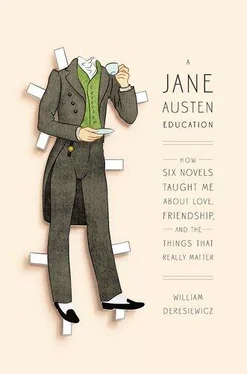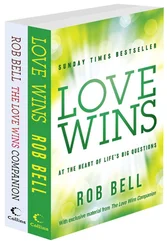I am very sorry to hear, Miss Fairfax, of your being out this morning in the rain. . . . Young ladies are delicate plants. They should take care of their health and their complexion. . . . I hope your good grand-mama and aunt are well. They are some of my very old friends. I wish my health allowed me to be a better neighbour. You do us a great deal of honour today, I am sure. My daughter and I are both highly sensible of your goodness, and have the greatest satisfaction in seeing you at Hartfield.
This was magnificently sweet, among the most touching moments in the book, and as an argument for simple human kindness—the concern for other people’s feelings that Emma so conspicuously failed to show, and that I was so clueless about myself—impossible to disagree with.
As for Miss Bates, she lived the novel’s highest lesson of all. Here was how Austen introduced her:
Her youth had passed without distinction, and her middle of life was devoted to the care of a failing mother, and the endeavour to make a small income go as far as possible. And yet she was a happy woman. . . . She loved every body, was interested in every body’s happiness, quicksighted to every body’s merits; thought herself a most fortunate creature, and surrounded with blessings.
Emma, who had it all, was forever discontented with the world around her—just like me, in my perpetual fog of resentful gloom. Instead it was Miss Bates—scraping by, facing a lonely old age, dependent on everybody else’s goodwill—who was the happy one. If her speech bubbled and flowed in an endless stream of little matters, that was only because, like Austen herself, she found everything around her so very interesting.
To pay attention to “minute particulars” is to notice your life as it passes, before it passes. But it is also, I realized, something more. By talking over their little daily affairs—and not just talking them over, but talking them over and over, again and again (the same story in brief, then in full, the same stories in one house, then another)—the characters in Emma were doing nothing less than attaching themselves to life. They were weaving the web of community, one strand of conversation at a time. They were creating the world, in the process of talking about it.
Yet again, it was Emma herself who had trouble with this. She loved to gossip with her special friend Mrs. Weston, of course, but when Miss Bates started in, she couldn’t get away fast enough, and Jane Fairfax’s letters were a fate worse than death. She was the cleverest and best-looking person around, and richer and more wellborn than just about everyone else, and she thought she deserved a more interesting life than the one that was on offer in Highbury. Like a bad reader, she was looking for intrigue and adventure, but all she ended up doing was cutting herself off from the people around her. And as a result, she cut herself off from herself. The fun of Emma was the way that the heroine, with her supreme confidence in her own judgment, was always screwing up, but the reason wasn’t that much fun at all. Like me, she was numb. She couldn’t feel what she felt, or know what she wanted.
But Emma finally learned that everyday life is not only more joyful—and more dramatic—than she could have imagined, it is also more joyful and more dramatic than anything she did imagine, any of her plots or daydreams. With those, she just played at feeling. But dull old, trivial old everyday life—that is where feeling truly lies. Finding that out, she found out whom she should marry, and I found out that this was where the novel had been heading all along. It really had had its heroine’s romantic future on its mind, but its mind turned out to be very, very deep. In the end Emma didn’t lack a plot; its plot was so clever that it could keep itself hidden until the very last, when all of its disparate parts leaped into order in a single instant, like iron filings around a magnet.
Emma’s life finally became real to her, and in reading about her life I felt mine finally becoming real to me. Sleepwalking through my days just wasn’t going to cut it anymore. Reading Emma, being asked to take the lives of characters like Harriet Smith and Jane Fairfax as seriously as they did themselves—not the exciting lives of heroes and heroines, which were so enjoyable to identify with, or the glamorous lives of celebrities, which were so much fun to read about, or the impressive lives of whatever big shots I happened to be remotely acquainted with, which made me feel so important, but the everyday lives of ordinary people, which matter for the sole reason that they are lives—made me finally begin to take my own life seriously.
Not that I hadn’t always taken my plans and grand ambitions seriously—of course I had. What I hadn’t taken seriously were the little events, the little moments of feeling, that my life actually consisted of. I wasn’t Stephen Dedalus or Conrad’s Marlow. I was Emma. I was Jane Fairfax. I was Miss Bates. I wasn’t a rebel, I was a fool. I wasn’t floating in splendid isolation a million miles above the herd. I was part of the herd. I was a regular person, after all. Which means, I was a person.
If I started to take my life seriously for the first time, I also started to take the world seriously. Again, I would have been surprised at the idea that I didn’t already take it very seriously indeed. Hadn’t I always worried about the big issues—politics, social justice, the future? Didn’t I spend a lot of time arguing about them with my friends, deciding how everything should be? But ultimately, all that talk was just theoretical, no more real in the feelings it involved than Emma’s ideas for rearranging the lives of the people around her. Austen taught me a new kind of moral seriousness—taught me what moral seriousness really means. It means taking responsibility for the little world, not the big one. It means taking responsibility for yourself.
As I read my way through Emma, my life began to acquire a sense of weight I had never experienced before. It was like one of those astounding moments when you look around at the world and really see it for the first time, feel its presence as a reality instead of just a bunch of concepts: water really is wet, the sky really is blue, this world really is the only one we have. As Virginia Woolf, Jane Austen’s most perceptive reader, had the heroine in Mrs. Dalloway reflect, “it was very, very dangerous to live even one day.” Not because life is so perilous, but because it is so momentous.
My ideas about literature were no more able to survive these revelations than were my ideas about anything else. Having worshipped at the altar of modernism, with its arrogant postures and lofty notions of philosophical significance, I believed that great literature had to be forbidding and esoteric: full of allusions that flaunted their own learning, dense with images and symbols that had to be pieced together like a giant jigsaw puzzle. A book, to be really valuable, had to offer truths that seemed as recondite as metaphysics and as final as Scripture—had to promise to reveal the nature of language, or the self, or time. Modernism was superior art for superior people, or so that snobbiest of literary movements believed. No wonder I disdained the herd; I’d learned that pose from T. S. Eliot and Vladimir Nabokov, every line of whose work strutted its contempt for ordinary people. Emma refuted the notion that great literature must be difficult, and it also rebuked the human attitudes that that idea was designed to justify. I still loved modernism, I just no longer believed it was the only way to make art, and I certainly didn’t think that it was way to live.
Читать дальше












